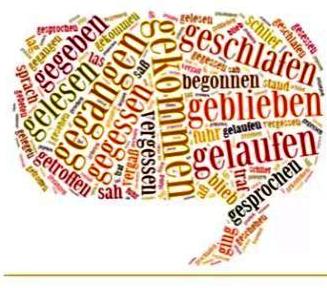Many are confident that, if desired, they can do without knowledge of grammar. After all, it is enough to practice English at meetings of speaking clubs, constantly communicate with native speakers, who will hear your speech and they will correct mistakes.
One way or another, you can remember the basic constructions and use them in everyday communication. And yet, you need at least a small grammatical base for full communication. And this is exactly the kind of base you can create yourself if you put in some effort. – not so difficult. And the grammar in English, although it looks scary and most likely associates you with a nightmare school years, quite suitable for independent study.
We have already told you. Today we’ll tell you more about how to study English grammar on one's own.
Some tips for those who study English grammar on their own
- Knowing the basics of grammar is essential. You can afford not to navigate the nuances.
- Don't look for logic in grammar. Not all rules can be explained logically.
- It is contraindicated to memorize rules without specific examples.
- Compare the rules of English grammar with Russian ones, find associative connections: this will help you remember some rules.
- The main thing you need to remember is: verb conjugation, tense definition and word order in a sentence.
- Try to diagrammatically depict the rule you are teaching.
- Pay attention to English every day. Even if you are taking a course, try to practice English every day for at least 30 minutes. Listen to books, watch films in English, remember the order of words in sentences. Systematic training for 20-30 minutes gives much more results than training once a week for three to four hours.
Resources for learning grammar on your own
The dictionary you should use first when learning grammar. It is this dictionary that demonstrates the use of words in different contexts and all kinds of grammatical structures. We have already talked about the language.A site that presents short and easy to understand grammar videos. In addition, many grammar rules are explained by native speakers.
A quality resource that will help you expand your theoretical knowledge. The portal contains more than 180 articles on grammar.A British Council resource that is an A to Z guide to English grammar.
A portal that contains articles on various grammatical topics and practical exercises. A resource that presents a selection of video clips. These video clips will help you understand many grammatical nuances.Another portal that offers high-quality theoretical material for studying grammar.
To practice using different words V different situations and improve your grammar skills, it is worth using.
We wish you success in self-study English!
When it comes to learning English - in any way: in courses, with a tutor, or even on your own - learning a language is usually associated with learning the grammar of that language. English grammar is not usually considered to be very difficult. On the contrary, there is a well-known expression about English that this language is remarkable in that you need to know little, but you can say a lot. However, there is so much talk around it, how many problems arise in learning it, not to mention how to use it for life.
How important is it to know grammar? We can talk about this as much as we want, everyone can express their opinion, and even though the opinions may be completely opposite, everyone will be completely right. “How can this be?!” - you ask. Maybe. After all, those arguing may have different look on what grammar is.
Grammar is usually thought of as a collection of rules according to which written and oral speech. And they write down all these rules in thick or not very thick textbooks and reference books. What's so difficult about remembering all these instructions? In childhood, we cram poems by heart, paragraphs for history or biology lessons... However, we sometimes cram the rules of grammar.
If you look at the percentage of successful written theoretical tests in English, you might think that our compatriots are not so bad with their knowledge of the language! But look at our tourists abroad, at the employees of organizations that foreigners visit as clients or partners, at the people on the street in major cities— can they just talk to another person in English? Not always. What is the problem, where is the mistake?
To know a language, we learn grammar. Having learned grammar, we still cannot use the language. Strange situation. Maybe we should take a better look at the subject of grammar itself and understand what it is?
In fact, there is a slightly different view of grammar, different from the traditional one. And, perhaps, it would be completely uninteresting - whether there is another view or not - if it did not allow us to solve the long-standing problem of teaching languages: when a foreign language is taught for a long time, but is never known well enough to simply talk with another person, understand him, to express your thoughts so that he understands you...
This A New Look on grammar belongs to the American philosopher, writer, researcher, humanist (we will not list all the titles of this man here - he was an incredibly versatile personality) L. Ron Hubbard. At one time, he more than once drew attention to the torment that students are subjected to and how modest successes they receive when studying with “professors of linguistics.”
And it wasn’t even this problem that occupied him so much as the understanding that the lack of understanding of the grammar of their own language by the Americans themselves leads them to have problems both at school and at work (when they have to learn new job descriptions, for example) that they cannot read and are functionally illiterate people. That is, most will be able to read an article out loud from the morning newspaper, but they are unlikely to be able to correctly understand what it says, let alone draw the right conclusions from what they read. To help people avoid such problems and make them more literate, L. Ron Hubbard researched this area and created a work he called The New Grammar. This is how he explains what grammar is, talks about its origin and function (purpose).
“Grammar is the way words are organized into spoken and written speech to accurately convey thoughts, ideas, and meaning to people. In essence, it is a system of agreements regarding how words are connected in order to achieve meaningful communication.
That's all about grammar. If it is defined differently, students will think that they are being taught school rules rather than how to speak and read.
This definition cannot be found in dictionaries because the grammar fell into the hands of grammarians who themselves did not understand the word “grammar”. This and only this makes grammar difficult. The purpose of the New Grammar is to circumvent the complications that arise from this. The grammar is based on general use and is pushed forward by writers. She found herself in a very muddy cycle in a very muddy river, finding himself in the clutches of the professors. That's what's wrong with this in the first place. It's not even difficult to understand. It is difficult to understand the inability of professors to write about it.
Grammar is not the study of anything. It is the use of something. And now the professor of sour cabbage soup believes that anything can be science. That's because he gets paid to tell people it's science. Grammar is a part of everyday existence, and if you do not know about it and cannot use it, no one can understand you, and you cannot understand others, and things and people will be a mystery to you for a very long time.
If grammar is defined as the way words are organized into spoken and written language to accurately convey thoughts, ideas, and meaning to people, students will be more eager to learn it than to feel like they are suffering under the yoke of sour cabbage professors who themselves have failed would talk or communicate. Grammar is something that people need to understand and be understood - that's all.
The grammarians of the past never understood what a word was, and they failed to define the most basic element of their subject.
They also failed to notice—and emphasize—the fact that language is made up of words, which most often have multiple meanings and can be used in several different ways. Without understanding this, language and grammar can seem very confusing.
These and many other errors have made this subject difficult to learn and apply.
The purpose of this book is to enable man to use and construct words and speech in such a way that he can convey his concepts and meaning clearly and clearly, and so that he can understand the meaning and concepts of others. It's all about grammar."
And now everything falls into place. This is a very practical thing and learning it is no more difficult than a children's construction set! When all of L. Ron Hubbard's comments on how languages should be taught were collected, in addition to this description of grammar, the English course known as in applied education centers as "English as a Second Language" (ESL).
The theoretical view of the subject was tested many times and each time gave an invariably quick and positive result: on an English course at Applied Education centers students (this could be people any age- from 18 to 80 years old, with any level of knowledge- from complete ignorance to knowledge of the language at the level of a certain vocabulary and rules) consistently gained the ability to use language in their lives. They could communicate. Of course, they could write and read, not only understand the interlocutor, but also express their thoughts.
The ESL course mentioned above uses approach to learning grammar through practice . This is why you can gain and develop your speaking skills so quickly. However, many people, for one reason or another, still feel the need to understand English grammar more deeply. And for all of you who need it so much, we have good news! Since April 2009, in Applied Education classes you can take theoretical course English grammar which is called "Grammar and Communication" .
Well written in simple language, full of illustrations , which makes the grammar easy to understand. "Grammar and Communication" taken in English , but you should not be afraid of this for the reason stated above: it is supplied with a sufficient amount simple texts and all concepts are well illustrated - with text examples and, often, pictures. The course can be taken by students starting at approximately level 4 of our ESL course, or by anyone with approximately the same level of English proficiency.
Choose! If you just need to know English for practical use, welcome to our intensive conversational English course “English as a Second language”. This spring it is especially profitable to study with us: all the benefits of our course have now become more accessible thanks to the new discount system, valid until the beginning of summer. However, to make your choice informed, come to our free introductory lesson to familiarize with methodology and test it on own experience . If you feel that you need to streamline your knowledge of English grammar, welcome to English language theory course.
Be educated, achieve your goals, let knowledge and command of English help you in life!

Learn German
![]()
Good day to all!
Today we will talk about a topic that causes a nagging toothache for many. Grammar.
The most common statements about it are: “German grammar is very difficult”, “... I’ve been studying for... months, I can’t remember anything...”, “... how to learn grammar...”, “. ..are there any ways to learn the rules?” and so on.
What is your relationship with the grammar of the German language you are studying? Are you, like many others, unable to remember the rules or forget them the next day?
I am sure that you are a big or very hard worker and will certainly master them.
But what a misfortune, knowing and being able to do so are not the same thing! Do you know how to instantly find in your head and apply the rules of grammar to the situation? Or in a dialogue, your brain begins to work like gears in a rusty clockwork: slowly and rigidly one gear moves another, and the second moves a third...

In a dialogue with a foreigner, you first translate a phrase into Russian, look for an adequate answer, remember the words of the foreign language one after another, remember the necessary sections of grammar (and there can be up to a dozen of them in one sentence!), construct a sentence and, finally, pronounce it. Ugh!
If so, my sympathy for you! But you are not alone. 95% of all people who study a foreign language speak or write it using exactly this algorithm. For them, like you, knowledge is separated from skill.
Ideally, you need to learn a foreign language in such a way as to integrate grammatical laws and lexicon into the thought process, or, more simply put, learn to think immediately in a foreign language.
Or vice versa, first learn to understand a foreign language, and then decode the rules of grammar yourself, as suggested to be done.
Why is it so hard to learn grammar
Let's first find out the reasons that prevent us from mastering the intricacies of a foreign language.
The principle from simple to complex
Firstly, training using the traditional method is carried out from the unreal, the so-called achieved level. Remember how in school, we studied one topic and moved on to another. That is, it is assumed that if the material is covered, then it remains in the head.
But that's not true. It has been proven that after a lesson, less than 1% of the information remains in memory. New topic We learn, we forget the past.
It’s like walking through a swamp: we pull one leg out of the quagmire, but the other gets stuck.

Therefore, it is useless to go directly through the “swamp” and master grammar according to the “from simple to complex” principle. You need to either go around the swamp, or know a path along which you can walk without the risk of drowning, or have a guide who is nearby and will help in any case.
Physiological features of the brain
Secondly, the fact that we have such difficulty learning a foreign language is to blame physiological characteristics human brain.
Scientists have discovered that children learn languages so easily because of their ability to imitate.
The child's brain is “sharpened” for the learning process, if only there were a role model. And if a foreign language teacher does not speak the language himself, then there is nothing to imitate.
On the other hand, if in a family, as in many third world countries, several languages are spoken, then the child begins to speak several languages at once, without making any effort, without experiencing difficulties or discomfort.

Unfortunately, as I grow older, human brain is being restructured from the process of absorbing information to the process of issuing information. And, from an evolutionary point of view, this is logical. The adult generation must teach the younger generation. This happens throughout the animal world.
Different types of thinking
Thirdly, all people are divided into two conditional groups according to the method of assimilation of information.
The first group includes people with a mathematical mindset. To assimilate new information, they need a certain algorithm, logic.
Such people like to understand grammar and learn the rules by heart.
The second company includes people who teach foreign languages intuitively, they do not need to know the rules to master the language. They learn languages intuitively, like children, simply by absorbing information.
And believe me, they know the language no worse, and perhaps better, than those who learned it according to the rules of grammar.
What is grammar
I liked Tatyana Chernigovskaya's lecture, in which she talks about the abstract concept of grammar. There is no grammar in nature.
This is why it is so difficult to teach abstract concepts in isolation from figurative content.
Grammar is acquired when learning a language, when using it.
Comparison of texts in Russian and German.
Take, for example, a sentence from a song from our “German music” section.
Not the simplest proposal, but a clear example.
Let's compare the translation. What features of languages do we see?
I liked it - Ich-hatte-gern(I had the pleasure) hatte - Präteritum from the verb haben.
I pretended to be dead - stellte ich mich tot(I put myself dead) totstellen– verb with a separable prefix tot, which is in Präteritum went to the very end of the sentence. Reflexive verb has an addition sich, and in Russian – a particle – Xia.
That's why - Darum. After union word in the Russian version there is a subject, and in German there is a predicate, reverse order words
That's about it. This analysis of the text gives Ilya Frank in his books on the German language.
That is, you read the text not only to obtain information, but also to understand how the language, that is, grammar, is structured.
Writing helps you learn the rules of grammar.
Today is an interesting day for me. I’m tempted to quote Tatyana Chernigovskaya.
It was from her that I heard that in ancient China, each applicant for a high position at court passed two exams. One of which was calligraphy. Not because the official had to write beautifully; there were plenty of clerks there. But because writing trains the brain.

You can read even more about the meaning of writing, according to the method of linguist and Guinness Book holder Mikhail Shestov.
Thus, tip N2: Take the sentence apart, understand the structure, write it down.
Don’t be lazy, rewrite the sentences by hand or on the keyboard, slowly, pronouncing each letter.
Come up with your own examples.
It's quite simple. Take the offer. Write down a formula for it. Then you substitute other words into the formula and get a great variety of sentences.
For example:
Ich gehe in die Schule.
Ich………in die Schule. We can substitute: fahre, laufe, schwimme, fliege...
Ich gehe in……... Where? Die Bibliotek, das Kino, die Kantine…
You can read even more about patterns Here.
And so, tip N3, write your own texts. The bigger, the better. Write about what interests you.
Just be sure to submit them for checking and correct errors by rewriting the entire text again.
Don't learn grammar rules by heart.
Make up rules that describe the patterns of language, in your own words.
Explain these rules to your friend or wife in a way that they will understand.
If you feel like cramming rules is making you depressed, put them aside. You will return to them again, but later, when you have an intuitive feel for the language.
Better do what interests you. If you love cats, watch You Tube with reports about cats, read labels on food packaging, cat lovers' blogs, and so on.
The most important thing is to remember that grammar is not a goal, but, together with words and pronunciation, a means of communication and information exchange.
Conclusion
And so that thoughts about German grammar do not make you sad, use the following tips:
- Study from textbooks in which the texts are presented in two languages. For example, tutorial ""
- Copy texts by hand or on a computer keyboard, dictating each letter of the word to yourself.
- Write your own examples for grammatical patterns.
- Write your own short texts with the grammatical structure you are learning.
- Don't learn grammar rules by heart. It’s better to describe the rule in your own words and tell someone about it.
- Pick up educational material on German about your favorite hobby.
That's all about grammar. I wish you all success!!!








